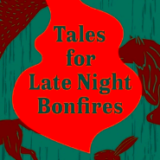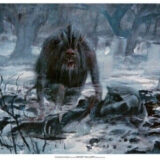
OBIR: Occasional Biased and Ignorant Reviews reflecting this reader’s opinion.

LACKINGTON’S magazine – issue #23, Spring 2021.
Publisher: Lackington Press, Ottawa, Ontario, Canada.
Editor: Ranylt Richildis
Cover Art: Carrion House A.K.A. Luke Spooner
Interior Art: Carrion House A.K.A. Luke Spooner.
A Sleepless Hunter’s Wanton Fruit – by dave ring.
Premise:
Rudgar the Rook, a mighty hunter and an even mightier warrior, is on a quest to kill the dreaming beast plaguing the land of Kala. Will he succeed?
Review:
I can’t help but compare this story to the barbarians in pulp literature of yore, especially the tales of Conan and his ilk. Robert E. Howard took pride in the rude and crude attributes of his heroes. Men of action all, with bulging muscles and little empathy. Violent men in a violent age. Daydream fodder for meek clerks toiling in silent submission to uncaring bosses and boring lives. They were a bit like them as loves the modern cliché vision of the Vikings. What guy doesn’t want to be a berserker, if only in his day dreams? The idea of being the greatest warrior of all still holds great appeal. Either that or being the best backyard BBQ burger-flipper on the block.
In the past the manly-men attraction of barbarian thugs has occasionally been accused of having a homo-erotic basis, but that’s a standard critical putdown (at least in the past it was considered a putdown) that can be trotted out on any occasion. After all, even Freud himself once famously said “Sometimes a cigar is just a cigar.” Interpreting heroes in Freudian terms is very much in the eye of the beholder, usually involving a beholder with an axe to grind. So, what would they, and Robert E. Howard make of this story?
Rudgar isn’t quite as confident as Conan, but then he’s worn out. The quest has become a burden. To take his mind off the coming confrontation with the dreaming beast, Rudgar rejects an overture from Morgolo the Mercenary and instead has sex with a monk. Well, dang. I wasn’t expecting that. I don’t recall a single instance of heroes bedding monks in the Conan tales.
Times, as they say, have changed. Furthermore, the sex is relevant (unlike most books where sex of whatever kind is thrown in to keep the reader awake) in that the Monk’s motivation has to do with protecting Rudgar from the beast, albeit in a disgusting way but one that makes perfect sense. (No spoiler here.) In short the homosexuality of the main character (and possibly all the characters) is taken for granted and serves the plot and characterization in a needful manner. In other words, the sexual ambiance is important, but no big deal. That’s a sign of good, quality writing. I do think, though, that Robert E. Howard would be nonplussed. Also, Rudgar employs a weapon in his armoury far ruder than anything Conan wielded. A touch of originality that.
The power of the story lies largely in its description, which is vivid and full of telling detail. One sentence I particularly liked was “The water of death was cool and refreshing.” Not the usual straightforward description but rather what I like to call “a nifty bit,” something different and beyond the average, in itself refreshing.
On the other hand, the line “This battle was the sort of fight that had earned the Rook his reputation: his blade snicker-snacked in clever thrusts and wild lunges, a pantomime of sex” makes me wonder if the story is intended to be a parody. Overall, however, I believe it is a straightforward quest-adventure with elements of humour mixed with horror. More importantly, well-written with many original “touches” that make it easily as interesting and fun to read as the original Conan stories.
The ending, I suspect, is inspired by an ancient Roman interpretation of a classical myth, but I offer not even a hint of what I’m talking about because the ending surprised me and I want it to surprise you.
The Partisans – by Kyle E. Miller
Premise:
The White Wizard and the Red Wizard live in separate towers, communicating in the night with words which appear like fireworks to the villagers below. Life is in balance. Than a strange beast appears. It begins to replicate and increase in numbers. The Wizards differ as to what this means. Which is correct?
Review:
I’m not surprised to learn that the author is an anthropologist. The story is a kind of fable or metaphor which can be interpreted in a number of ways. At its heart is a demonstration how a new phenomenon can trigger varying interpretations which, as further developments occur, quickly becomes “Gospel” which increasing volumes of evidence serving only to cement in place rather than produce new interpretations. Think of it as the scientific method become rigid and fossilized.
One way of looking at the premise is to view it in political terms. Certainly, no matter how bizarre or devoid of reality the view of this or that politician, anything “new” is quickly subsumed into the evidence justifying and supporting the politician’s creed. In a sense, this makes politicians, and their followers, immune to mere facts and truths. We’ve seen a lot of that lately, or such is my opinion. This makes the story very relevant to modern times.
Then again, the story can also be applied to human nature in general. It could be just as metaphorically relevant to the problem of first contact with aliens. Think of movies like Independence Day or Mars Attacks, where some people welcome the advent of aliens and others fear their coming. For dramatic purposes the aliens almost always turn out to be evil. Let’s just hope that, should it ever happen, the aliens will have no sense of theatre. Point is, whatever they turn out to be like, Angels or Devils, the human race will forever argue among ourselves what they are really like. I suspect the aliens will find this exhausting. They’ll probably leave as soon as they understand how hopeless we are at understanding reality.
This story brings out very nicely what a fundamental problem it is to be human.
The Last Stanza of General Pfeil – by H.L. Fullerton
Premise:
General Pfeil’s daughter designed a memorial statue for a former enemy nation. It stands at the site of the war-winning battle commanded by General Pfeil. She accompanies her daughter to see it, more-or-less incognito as the artist’s mother. Painful memories awaken.
Review:
Being a literal-minded twit, I found it hard to interpret this. Bit of a surreal horror story which would speak to veterans of any war. Win or lose, memories haunt. All wars are horrible. A “just war” or a “good war” is more a matter of myth and propaganda. A war may be necessary, but it is never fun. All veterans know this. This story conveys that message quite well.
So why did I find it difficult? Call it (no pun intended), a poetic story. The war seems to have been fought with canon and arrows, the latter handcrafted and inscribed with lines from poems. The implication seems to be that it is the quote that kills, not the arrow. And post war poetry chap-books evidently are equally magical, requiring ritual burial to purge memory. Some veterans are haunted more than others, being plagued by patiently-waiting vultures. Both vultures and poems are avatars of death that need to be confronted to heal emotional wounds.
In short, a heck of a lot of symbolism I can’t quite grasp. Doesn’t matter, the sense of loss and regret comes through loud and clear. As does the fact that non-veterans never, ever get it right as to what the war, any war, was really like. Nor do they want to know. Myths are more comfortable, more soothing. Being a war veteran is a well-nigh insoluble problem, to be coped with as best each individual can. Wars are like nightmares. They are locked inside your brain and it’s up to you to deal with your pain, because even fellow veterans don’t fully understand your particular, your very particular, one can say unique, experience.
So, while the literary technique might be off-putting to the more literal-minded, the tone and emotion of this story speaks plainly, even brilliantly, to the turmoil and impact of war on the mind and soul of veterans. Powerful story.
Synesthesia – by Devin DeMarco
Premise:
Gust and Denny and Tile and an unnamed girl are a sports team confronting the Falcons at their home arena. Can they overcome the home team advantage?
Review:
So, what kind of team, you ask? Something exceedingly surreal. Salvador Dali would probably have loved this story. Sound and smell and taste and even physical action can alter reality in truly bizarre ways. Sounds give off colours that can make you vomit. An appropriate colour can turn air into shards of glass you can slice apples with. Teammates are thickly padded for protection, their heads encased in sound muffling helmets, and their plays consist of hurling music and gestures at their opponents. Winning depends on how often you can disorient the opposing team members to collapse on all fours. God only knows what it is like for the audience to witness. Probably both beautiful and brutal.
One could argue this is the sort of fantasy where magic is cheap and easy so it is constantly changing the rules and anything can happen, thus sucking all the conflict and drama out of the story. But that’s only if the reader doesn’t pay attention. In fact there is a logic and rationale behind action and consequences in this game, shifting the story into science fiction, but there’s no underlying explanation. It’s a matter of taking for granted that this technology exists and that organized sport is one of the uses to which it is put. That be the impossible premise the reader has to accept for the sake of the story.
You really have to concentrate and focus to make sense of what is happening, because even ordinary actions like walking down a hall produce extraordinary results. I don’t recall ever reading anything remotely like this story. It is a challenge to read, but also rather exciting. It’s a tour de force of original description which strikes me as wildly innovative. Definitely made me sit up with delight and read it avidly.
And yet, sports fans will be glad to note, the plot fits solidly into traditions of sport fiction, and in that sense is easy to understand and quite convincing. But the plays! The plays! Not your average sports tactics, believe me. Prepare to have your mind boggled.
Nights of the Swollen Moon – by Christina Osmeña
Premise:
Strangers rarely come to the island. Even the Japanese occupation force had consisted of but one man now hiding in a cave refusing to believe the war is over. Clarita arrived without explanation. Then came Memorare Puzon. He took over her house. Took over her life. Now she’s disappeared. How?
Review:
I suppose the island represents any closed community whose inhabitants are expected to conform. No wonder Clarita is treated as an outsider at first. She fails to meet community expectations and standards. Puson isn’t popular either. No one understands how Clarita fell under his influence. Yet he isn’t blamed for her disappearance. Everyone joins in the search.
I’m guessing this story is a metaphor about how difficult it is for newcomers to fit into a community, and by extension, how difficult it is for anyone to fit into a relationship with someone who is, to begin with, a total stranger. The perils in life equal the perils in dating? Whatever and whomever you choose you takes your chances? Especially if you let yourself be the victim of someone else’s choice?
Perhaps the ultimate message of this story is that everyone is ultimately and truly alone? There’s really no such thing as love and companionship? Only manipulation and abuse? If so, a rather bleak prospect. Yet the busy bodies who define the norms for the community seem content. Possibly the Japanese soldier in his cave, as well. Perhaps the point is that you suffer only if you let yourself suffer. This is a tad more optimistic than the idea that suffering is inevitable.
I’m probably overthinking this. This tale is a slightly unreal or off-kilter fantasy piece dealing, according to the editor’s forward, with war-time trauma. I did notice hints that Clarita had suffered at the hands of the Japanese, possibly as a forced military prostitute, and that she came to the island in order to flee her memories.
It is a sad tale, one that I suspect holds great meaning for women who have been victimized by misogynistic men. As a man, I find the story low-key but grim. One thing for sure, it makes the reader think. Not for the faint-of-heart who prefer cozy resolutions.
Sir Balin the Savage and Good Sir Balan – by Craig Hinds
Premise:
Balin and Balan are two brothers, both knights, who want to serve King Arthur. Balin first kills King Arthur’s cousin, then slays the Lady of the Lake. Suffice to say, Arthur is not pleased. The brothers head off on what is likely to be a very deadly quest.
Review:
I am not a fan of the bulk of Arthurian legend which was invented centuries after the death of the real King Author. If near-contemporary sources are to be believed, the actual King Author was the last of a series of Romano-British leaders attempting to stave off the Angles, Saxons, Jutes and other Germanic hordes slowly acquiring more and more territory in Britain. The earliest accounts reference complaints over the high taxes he imposed to pay for his army, which were probably Eastern-Roman style cataphracts or armoured Calvary. In other words, I have always been keenly interested in the historical Arthur, and paid no attention to later accounts. I draw the line after the “venerable Bede.” Medieval legends and later I have always avoided. Consequently, I have never heard of Sir Balin and Sir Balan.
In and of itself, their legend, being cursed and all, is quite entertaining. This particular fictional treatment seems to cover all the basics, such as inadvertently using the spear, which Longinus had used to stab Christ on the cross, to wound a king and destroy his kingdom, albeit concentrating on details to exaggerate certain aspects of the legend to appeal to the modern horror-fantasy crowd. In that sense I suspect this version meets today’s popular taste better than previous accounts would. Don’t know that to be true, but it is a fact that I, someone who finds most medieval legends boring, really enjoyed this story. It is dark and bloody-minded fun. That, of course, is what a tale of two cursed brothers call for. The author delivers.
CONCLUSION:
I can’t claim to have fully understood the intent and purpose of every contributor to this issue (some might say none of them in fact) but I did my best to convey my impressions and my best guesses. That is the critic in me.
The main thing to note is that all of the stories in this issue are interesting, stimulating, well-written, and thought-provoking. Editor Ranylt Richildis has once again held to the highest literary standards. Lackington’s Magazine is always a pleasure to read.
Check it out at: < Lackington’s Magazine #23 >










